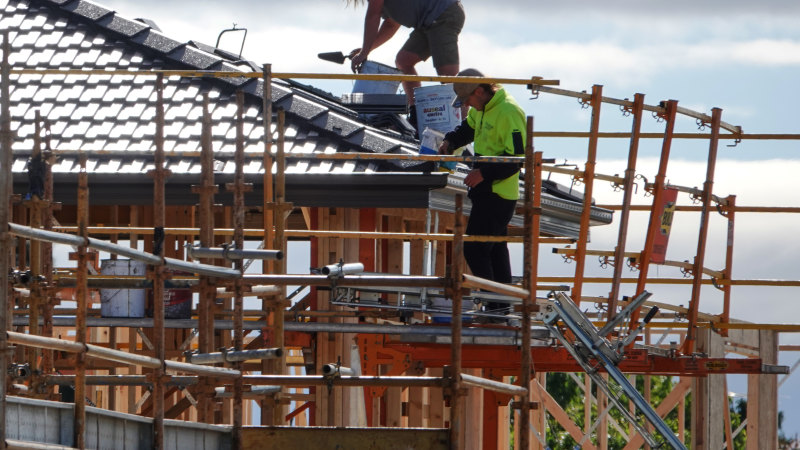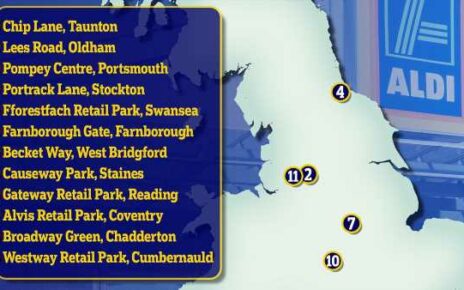Save articles for later
Add articles to your saved list and come back to them any time.
Victorian home buyers would be given the option of paying annual land taxes instead of upfront stamp duty as part of a package of proposed reforms to tackle housing affordability and strengthen the state’s tax base.
The Department of Treasury and Finance has been examining options to modernise the tax system to ensure it remains “adequate” to meet looming spending on services and infrastructure.
The state government is looking at a range of reforms to tackle housing affordability.Credit: Jason South
The review comes amid rising concern about growing reliance on stamp duty – a highly inefficient and much-maligned tax blamed for exacerbating the state’s housing affordability crisis and discouraging people from moving.
Last financial year, stamp duty raised about $10.4 billion – equivalent to a record 33.9 per cent of the total tax haul. That was well up on the long-term annual average of about 23 per cent over the past 25 years. After adding in land taxes paid by investors, property taxes accounted for almost half, or 47.5 per cent, of Victoria’s tax take in 2021-22.
Government sources not authorised to speak on the record said reliance on stamp duty as a single revenue had left the state’s financial position increasingly vulnerable to fluctuations of the housing market, with cyclical downturns leading to the loss of billions of dollars of revenue.
According to Treasury’s latest predictions, the government will collect an annual average of $8.4 billion in stamp duty over the next four years, down about 19 per cent from the record stamp duty haul in 2021-22.
Asked about the existence of a Department of Treasury and Finance tax review, a spokesman for Treasurer Tim Pallas said: “We constantly review our revenue system to ensure it is appropriate to fund the services and infrastructure that Victorians rely on.”
As revealed in The Age, a suite of planning reforms, including potentially a reduced role for local councillors in statutory planning decisions, is also being developed as part of a wider housing package, likely to be unveiled later this year.
State Treasury’s tax review is being conducted in parallel with an upper-house stamp duty inquiry in state parliament, chaired by Animal Justice MP Georgie Purcell, and deputy chaired by opposition shadow special minister of state David Davis.
One option that has been considered by Treasury is to give some home buyers the choice to either pay stamp duty up front, or pay a smaller annual property tax, similar to council rates, as part of a housing affordability package to dramatically cut the upfront cost of buying a home. Once a property has been designated as attracting land tax, it would remain so, even when resold.
The idea of replacing stamp duty with an opt-in land tax is similar to the system operating in NSW that was introduced by the former Perrottet government.
Under that system, introduced on January 16, first home buyers have the option of paying an annual property tax bill for dwellings worth up to $1.5 million, saving them from an upfront stamp duty bill of up to $66,000, which can be used for a deposit.
But from July 1, the new state Labor government in NSW will replace those changes with a system in which first home buyers pay no stamp duty on homes worth up to $800,000, and a concessional rate for homes worth up to $1 million.
Housing affordability remains a crucial political issue in Victoria, although the Andrews government has so far been circumspect about the prospect of meaningful economic reforms.
A key concern in Victoria is that revenue lost in moving away from stamp duty towards a more stable revenue source from land taxes could leave a multibillion dollar hole in the budget at a particularly tight time for the state’s finances.
One view is that any reforms should be tackled at the national cabinet level – potentially through the National Housing Accord – because any state reforms would have broader productivity benefits for the national economy.
Federal Treasurer Jim Chalmers previously told The Age he was prepared to lead a national conversation to see if a consensus could be reached, including for states wanting to flip stamp duty for an annual property tax.
He said specific reform proposals were ultimately a matter for the states. But he warned all jurisdictions were facing substantial budget and economic challenges, signalling the federal government was keen to work with the states on a new round of productivity-enhancing reforms, reminiscent of the National Competition Policy reform process launched in the mid-1990s.
The Grattan Institute’s submission to the state parliament’s upper house inquiry has warned Victoria has one of the least efficient tax systems, with each dollar of revenue raised costing the economy 30¢.
Grattan Institute economic policy program director Brendan Coates has estimated Victoria’s heavy reliance on stamp duty has been costing the economy up to $5 billion a year.
The Morning Edition newsletter is our guide to the day’s most important and interesting stories, analysis and insights. Sign up here.
Most Viewed in National
From our partners
Source: Read Full Article


